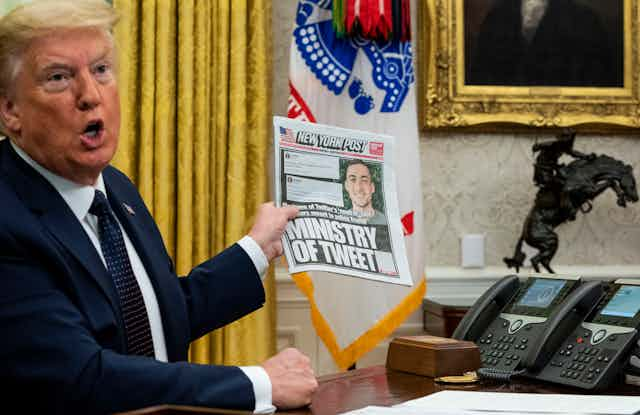Following the January riot at the US Capitol in Washington, tech giants moved rapidly to “de-platform” Donald Trump, in a move that could well have hurt more than any impeachment could have. Social media was a key tool for the former US president who would use it to unceremoniously fire personnel, settle scores – even threaten war, as he famously did in 2017 in response to North Korean nuclear weapons tests when he tweeted that the US was “locked and loaded”.
All the signs are that he wants to maintain his hold over large sections of the Republican Party, but he’ll struggle without the help of Big Tech. And there’s no sign yet that the social media giants are planning to roll back on their bans. Despite what a drawcard the former president undoubtedly is, platforms such as Twitter and Facebook have clearly come to the conclusion that his brand of incendiary rhetoric is simply too dangerous – for the country and for their brands.
Within two days of the Capitol riots, Twitter released a detailed statement to explain its ban: Trump had breached the company’s glorification of violence policy in two specific tweets sent after the riots. One, in which Trump informed his followers that he wouldn’t be attending Joe Biden’s inauguration on January 20, “may also serve as encouragement to those potentially considering violent acts that the Inauguration would be a "safe” target, as he will not be attending", it said.
Other tech giants responded in a similar way by disabling platforms associated with Trump. Facebook suspended Trump’s profile indefinitely pending the outcome of a review by its new oversight board.
The five-member panel has begun its review of Trump’s suspension. This is likely to be the board’s most significant review since it commenced work in October 2020. That’s partly due to Trump’s profile – but mostly because its decision (which will be binding on Facebook) will have implications for how the platform responds to political speech going forward. Its decision will be published here.
Google, which also owns YouTube, suspended Trump’s YouTube channel – initially for seven days “minimum”, but the suspension was subsequently made “indefinite” due to “concerns about the ongoing potential for violence”.
Big Tech is notoriously slow to crack down on incendiary contributors – perhaps because it’s in their financial interest to maintain the status quo. Certainly, the fact that Twitter’s share price slumped after Trump’s removal suggests that he and others like him are valuable assets for these platforms and that it’s in their interests to hang on to these assets, even if that means hosting contributors that fray societal cohesion, threaten democracy and ultimately lead to the type of violence that engulfed the Capitol.
Don’t blame the shareholders
Corporations regularly become embroiled in controversial situations, but it’s not just hosting divisive characters on your social media platform that gives rise to controversy. There are plenty of examples of enterprises that make the most of tax loopholes or exploit “gig workers”. You’ll often hear them blaming the “profit-maximising shareholders” and claiming that they are obliged to take these tough decisions to maximise shareholder wealth.
This is simply not true. In fact, most corporate law frameworks around the world allow management to decide whose interests they’ll prioritise in making decisions. They could prioritise employees’ interests, those of the environment and society at large or they could prioritise shareholders’ interests. The point is that they don’t have to prioritise the latter.

This is certainly the case for Big Tech. All of the tech firms referred to above – Twitter, Facebook and Google – are incorporated in the US state of Delaware. The significance of Delaware is that its courts have recognised that management have discretion to pursue interests other than shareholder wealth maximisation.
So, if these tech firms decide to reinstate the accounts of Trump and his acolytes having realised that his removal is hurting their bottom line, don’t believe them if they say, “The shareholders made us do it.” From a corporate law perspective, the power rests with the chief executives.
It’s up to these businesses whether they host Trump and others like him because he attracts the eyeballs and thus the money – just as it’s up to them whether they remove incendiary contributors in the interests of social harmony.
You could reasonably argue “de-platforming” incendiary or divisive voices has a chilling effect on free speech (regardless of what it does for a social media platform’s bottom line). But, perhaps more important is that by taking steps to detoxify the worst content, social media companies are finally recognising their potential impact on democracy – and the responsibility that comes with it.

